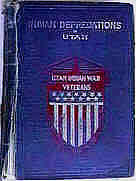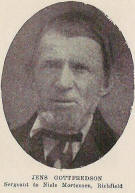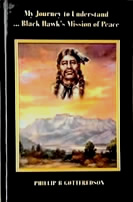The following excerpts are taken from my great-grandfather's book Indian Depredations in Utah. Both Peter and his brother Hans were friends of the Timpanogos during the Black Hawk War, and spent much of their time with them. Neither Peter nor Hans had any political or religious agenda with the Natives. Over seven years, Hans employed the Natives to make river trips on the Colorado River. He camped with them and learned their language, traditions, and customs. They give some fascinating insight into the Natives' life and beliefs. Hans and Peter have written the following, somewhat tongue-in-cheek at times, pointing to the playful humor and superstitions, friendship, and generosity of the Native people. - Phillip B Gottfredson
The Timpanogos and Paiute Indians have traditions very similar Hans J. Gottfredson was in business at  Eldorado Canyon on the Colorado River for about seven years, and employed Piute Indians to work for him. He camped out with them a considerable time and from them learned some of their traditions with regard to the creation, and the Lord's dealings with his children. They believe when the earth was created that it was level and beautiful, that fruit and vegetation grew spontaneously, that game was plentiful everywhere and that all was peace, that God (Towats) lived in the south, and that the Lord had two sons. The elder son, who was independent and took acre of himself, was the father of the Indians who inherit his nature: the younger was a cry baby always wanting everything he saw, and he is the father of the white people. The Lord granted him his desires, and the whites inherit his disposition, that is the reason why the white people are smarter in getting and inventing and making things. But as orators they are not the equals of the Indians.
Eldorado Canyon on the Colorado River for about seven years, and employed Piute Indians to work for him. He camped out with them a considerable time and from them learned some of their traditions with regard to the creation, and the Lord's dealings with his children. They believe when the earth was created that it was level and beautiful, that fruit and vegetation grew spontaneously, that game was plentiful everywhere and that all was peace, that God (Towats) lived in the south, and that the Lord had two sons. The elder son, who was independent and took acre of himself, was the father of the Indians who inherit his nature: the younger was a cry baby always wanting everything he saw, and he is the father of the white people. The Lord granted him his desires, and the whites inherit his disposition, that is the reason why the white people are smarter in getting and inventing and making things. But as orators they are not the equals of the Indians.
At one time the father became vexed at his children for some cause or other and tearing through the country from south to north he tore up the land as he went along, leaving it in the present condition, with mountains, hills, and deserts, and not fertile as it is now. But he will sometime come back and level the land and make it as it was before. Then it will be the happy hunting ground. The Indians are superstitious and believe there is some kind of charm about writing and making pictures. The also believe in Satan (Shin-nob) who is always bent in doing them harm, that he delights in seeing people do wrong. They do not serve God because he is good and will not harm anything; but they serve Satan through fear; they want to keep peace with him. Many of them, when they eat, throw the first bite over their left shoulders, and when asked what that is for, they say that it is to feed Satan to keep peace with him. They believe that the white people can write to him and he will cause sickness or trouble to come onto others. And should you write the name of an Indian on a slip of paper and tell him was going to send it to Lucifer, the Indian would risk his life, if necessary to get possession of it. When trouble comes to him, they think, that if they do something to please him that it will stop the trouble.
The Timpanogos have no marriage ceremony. They buy and sell their women and daughters. They have many wives, and the women do all the hard work, dressing all their skins. When the hunters return from a hunt, if he brings in any game the women unload it and unsaddle the horses. The hunter does nothing more until the meat is gone, when the women bring up the horse, saddle him, and he goes on the hunt. The men are intensely fond of gambling, horse racing and shooting at the target. The women love to gamble with sticks for beads and paints, ect; and are also fond of playing ball in the summer time. They are very affectionate to their children.
The Timpanogos According to Peter Gottfredson
During the early 1860's the Indians were hospitable if a person came to their camp hungry, and they expected the same from the whites. If they were trusted with anything, they could as a rule be depended upon, and were generally truthful; they despised a falsifier. There were many small bands of Indians in the country at the time, and we could run onto an Indian camp in many places. In the summer of 1864 I was herding cattle and sheep in Thistle Valley. Once I followed some cattle tracks into the west mountains traveling over hills and canyons for about fifteen miles to Mount Nebo. As it was late in the day, night soon over took me. I had with me my Kentucky rifle and a dog. The night was dark and I could not remember how many canyons I had crossed I went down the wrong canyon. Near midnight I was attacked by a lot of dogs and I knew they were Indian dogs. They were fierce and had it not been for my dog, it hard telling what the result would have been. I yelled when some Indians got out of their blankets and came up and called off the dogs. I went down with them to there camp. They knew me and said I was the sheep captain. Some young squaws came out and stirred up a fire and roasted deer meat for me. They offered me some of their bread which was made of berries and large wingless black crickets the size of the end of my thumb, they call it Queash. I showed them the cricket legs and said they were "Kay-wi-no" not good. They laughed at me. The Indians offered me blankets to sleep in but as I told them that my folks would be worried about me and would be out at daylight hunting for me. An Indian went down the canyon with me about a mile to where a trail led into Thistle Valley, and I got to the camp about daylight. The Indians realized that they were being crowded off their hunting grounds and would often tell us so; they wanted cattle, horses or sheep in payment for it. They never stayed long on a camp ground but moved to new hunting grounds and pastures for their horses where food could be found for their horses. In the morning before breaking camp. The Chief would call the Indians around him and talk to them for half an hour or so, instructing them as to their movements. Then each would go their several tasks some would go hunting on the way to the new camp ground. The squaws would do the packing and moving of camp while the men and boys would gather up the horses and did the easy work.
They loved hunting, and as scouts and trailers they were far superior to white men. If a twig had been newly broken, or a stone moved they always noticed it and learned the cause. They were so thoroughly acquainted with the mountain trails, canyons and watering places, and knew the hiding places in case of danger or pursuit so well, that they were hard to locate. They would often travel long distances without leaving any tracks or signs, by concealing their movements. They generally made small fires and hovered closely over them, burning sage brush, which made the best embers and coals and kept the fire better, when covered, than other wood. They thought white men foolish for making large fires and have to sit back. The Indians always smelled smoky because of sitting over their small fires so much, and being in their wicki-ups.
 Jens Gottfredson -Father
Jens Gottfredson -Father
Jens and Ole Jensen in Thistle Valley
by Peter Gottfredson
"My father, Jens Gottfredson, had taken the Mount Pleasant dry stock to herd in Thistle Valley, and also stock from Moroni and Fairview, as well as a part of the Mt. Pleasant sheep. An old gentleman named Ole Jensen had charge of the remainder of the sheep. Six or seven families from Fairview had settled in the Valley, about six miles from the herd house we occupied. All went well till along in August, 1864, when the Indians became hateful to the families down the valley and demanded a lot of horses and cattle for the land, or they wanted them to move off, and they made some threats. The people consequently moved back to Fairview. A few days later fifty or more Indians came up to where we were, about a half mile south west of the present site of Indianola. The old gentleman Jensen was northeast of the herd house, about one quarter of a mile, taking out his sheep. An Indian rode up to him and asked for his dinner, which he wrapped up in his coat. Brother Jensen refused, whereupon the Indian grabbed his coat and dinner and jerked it away from him, laying it across his saddle in front of him. The old man caught the horse by the bridle with one hand and his coat with the other., and with a quick pull got the coat away from the Indian, nearly pulling him off the horse. Jensen followed his sheep, and after getting away about 75 yards, the Indian fired at him; the bullet grazed his face and killed two sheep in the herd.
My brother (Hans) and I were a short distance west of the herd house when another Indian who had seven or eight dogs with him, came after us and made for our sheep. We had a large brindle dog which had been brought in with Gen'l Johnston's Army. We sicked him after the Indian dogs and he threw them right and left; this stopped their rush for the sheep. The Indian then came towards me. He had, besides a gun and bow and arrows, a large painted wagon spoke, with a string through the small end, hung on his wrist. I suppose he used to whip his horse with. As he rode up to me, acting as if he wanted to hit me with it, I kept backing away from him, but could not move fast enough to keep out of his reach. I asked him what he wanted, and what was the matter with him, but he would not talk. When I saw I could not back fast enough to keep out of his way I squatted down, cocked my gun and with my finger on the trigger pointed it at his face. He jerked his horse back so quick having what we call a jaw-breaker bit, the horse fell back on his haunches but the Indian stayed with the horse. He then began to talk. He asked what the people said who moved up from below. I said, "nothing." He said, "you lie." I told him that they said that the Indians wanted more horses and cattle for the land than it was worth. He said "alright" and rode to the herd house were all the Indians had gathered by this time. They broke open the door and went in and took and carried away all our bedding, provisions and cooking utensils and other things, and started towards Fairview. When near the divide, they met Lyman Peter's, coming to Thistle Valley, when they saw his head over the ridge, they pulled their guns out of their cases. Peter's saw it, and got off his horse, turned it between him and the Indians, laid his gun laid his gun across the saddle, pointing it towards them, and asked what they wanted. They answered "navish" nothing, placed their guns back in the cases and came on. As they passed Peter's, one of them made a grab for Peter's gun, but as Peter's struck the Indian with his gun, the Indian dodged and hit his own horse on the shoulder, laming him.
Peter's then came down to where we were and we told him what the Indians had done. Just then one lone Indian, who had been hunting, came down through the brush on foot. When he was off about three hundred yards, Peter's rested his gun on a knob on the corner of the house, cocking it and said, "Now see me make that Indian jump ten feet in the air." I told him not to shoot as that would cause trouble." He answered, "No one will ever know it." Believing he intended to shoot I pushed the gun off the knob.
Before the Indian had come up Peter's had set his gun against the house; it was a large new rifle. The Indian took hold of the gun to look at it, but Peter's took the gun from the Indian saying, "You let that be." The Indian answered, "you mad." Peter's said, "yes I am mad." The Indian said, "hombo (what) make you mad." and shoved his finger around on his body, saying "you bullets no pass." Lyman Peter's took a large handful of bullets from his pocket and showing them to the Indian said, "Don't you think they will pass." The Indian started off, looking back over his shoulder till he got a long way off.
NEXT: Hans and Peter find a skeleton


